THIS WEBSITE IS INTENDED FOR US HEALTHCARE PROFESSIONALS ONLY.
I certify that I am a healthcare professional in the US.
NOSimplify the VMS conversation with easy-to-use VEOZAH resources
Download or share resources below
- Provider
- Patient
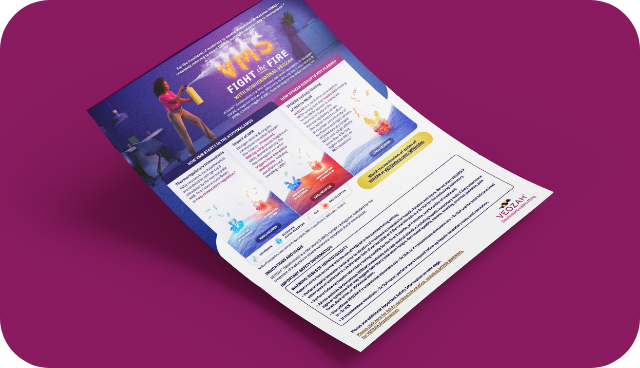
Size: 711 KB
Quickly reference VEOZAH in your practice.
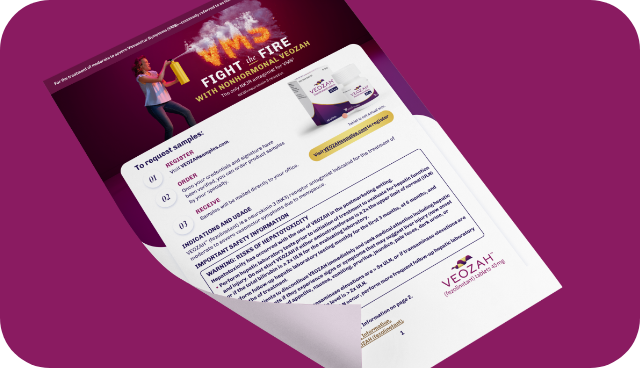
Sampling card
Size: 764 KB
A quick overview on how to request samples for your practice.
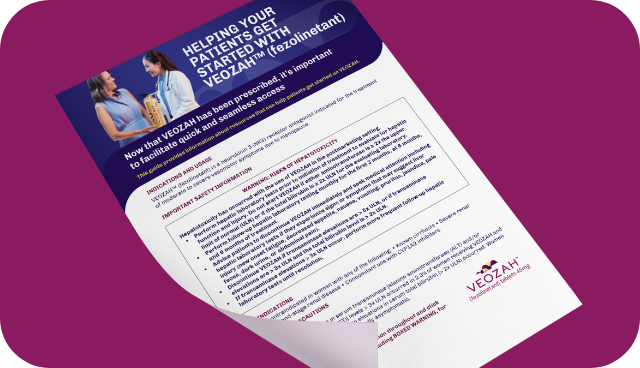
VEOZAH Savings Card and access brochure
Size: 1 MB
Size: 1 MB
Facilitate a quick and seamless conversation around accessing VEOZAH for your patients starting treatment.
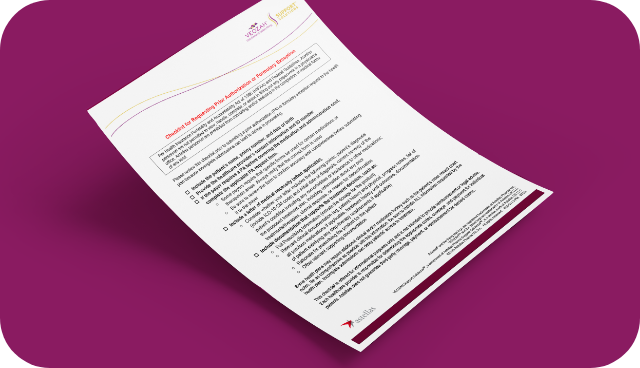
VEOZAH Support SolutionsSM prior authorization materials
Access prior authorization information, including a list of ICD-10-CM codes, a checklist, and a sample letter of medical necessity, all in one place.
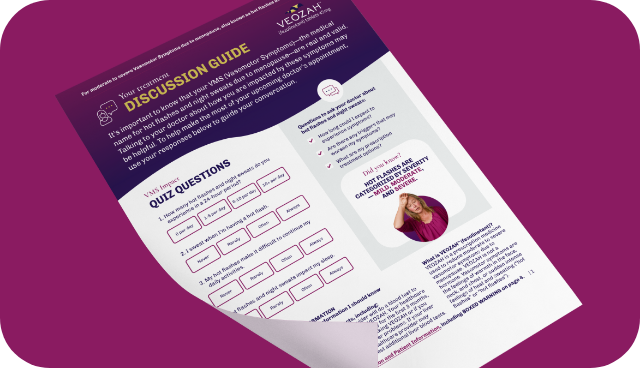
Doctor discussion guide
Size: 5.7 MB
Offer this guide to your patients to help them reflect on how they want to discuss VMS with you.
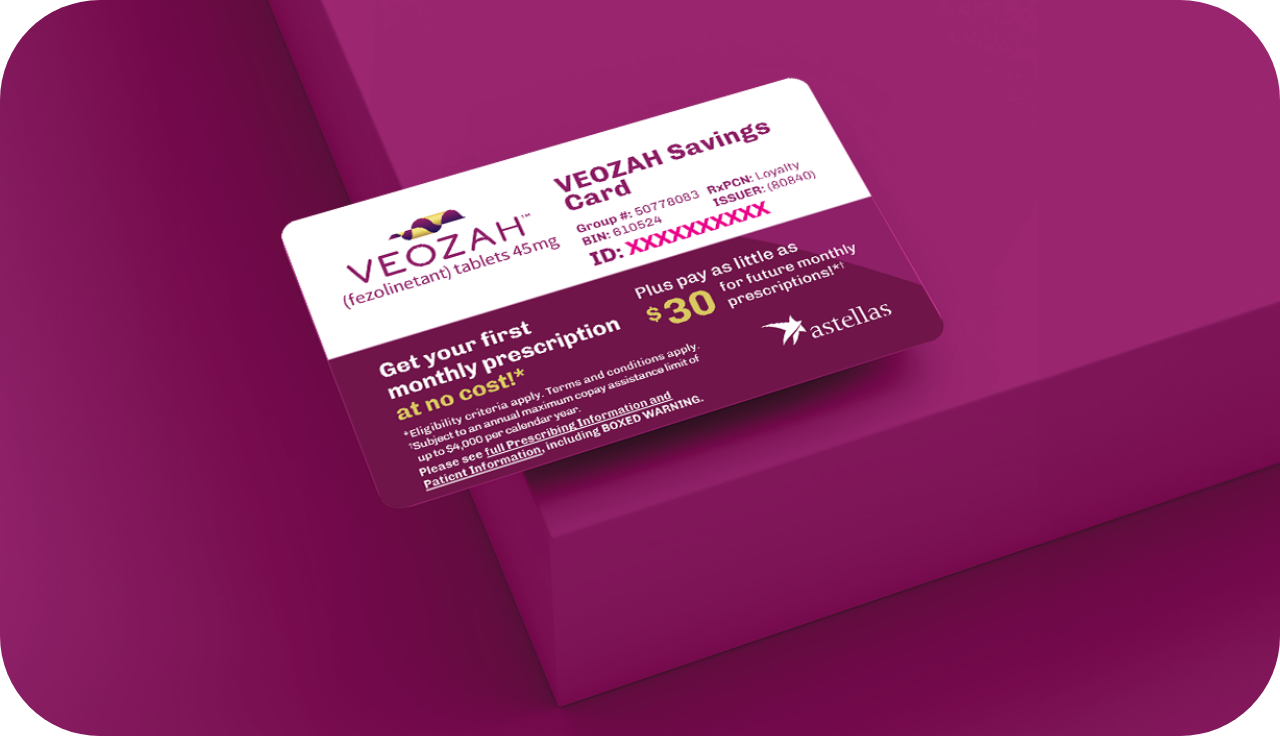
Digital downloadable savings card
Size: 343 KB
Prescription savings may be right at your patients’ fingertips.
For commercially insured patients. Eligibility criteria, terms, and conditions apply. The program is not valid for patients whose prescription claims are reimbursed by any state or federal government program.
VEOZAH Free Trial Voucher
Utilize the VEOZAH Voucher Program to provide your patients with a 10-day free trial offer*
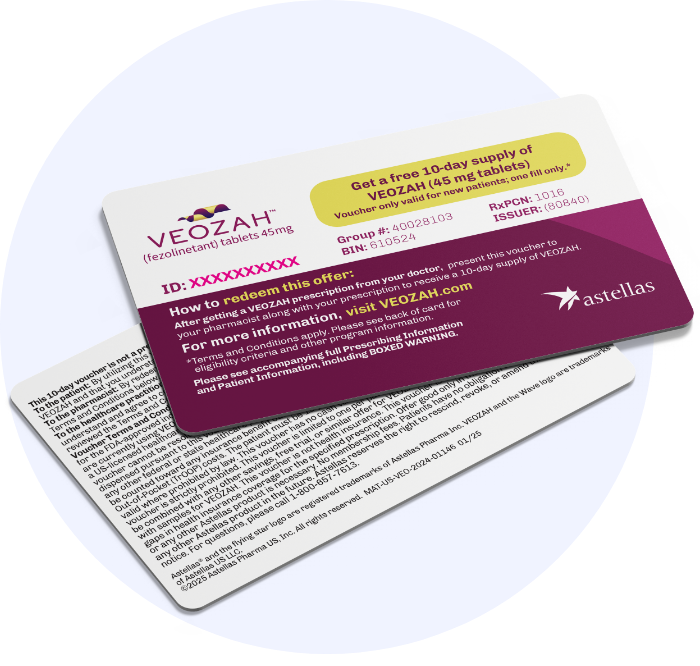
- Order vouchers to be shipped directly to your practice within 10 business days
- Offer these one-time-use vouchers to your eligible patients to initiate treatment
- Instruct patients to fulfill vouchers at their local pharmacy to start free trial*
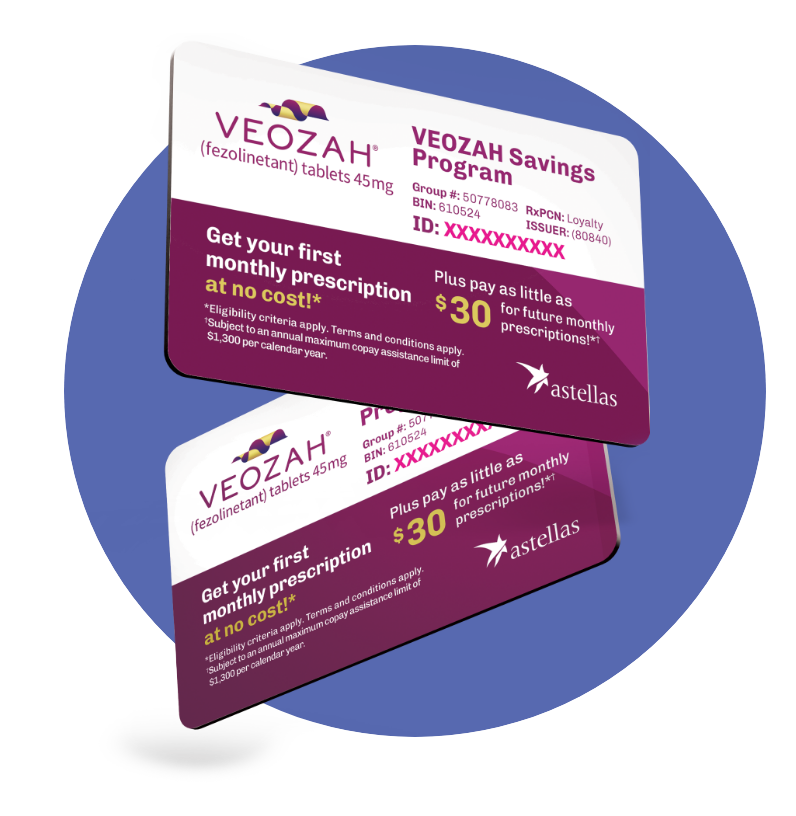
*Requires a 10-day VEOZAH prescription. Only new patients may use this voucher. Patients who have previously used or are currently using VEOZAH are not eligible for this voucher offer. See below for full Terms & Conditions.
IMPORTANT SAFETY INFORMATION
INDICATIONS AND USAGE

IMPORTANT SAFETY INFORMATION
INDICATIONS AND USAGE
WARNING: RISKS OF HEPATOTOXICITY
Hepatotoxicity has occurred with the use of VEOZAH in the postmarketing setting.
- Perform hepatic laboratory tests prior to initiation of treatment to evaluate for hepatic function and injury. Do not start VEOZAH if either aminotransferase is ≥ 2x the upper limit of normal (ULN) or if the total bilirubin is ≥ 2x ULN for the evaluating laboratory.
- Perform follow-up hepatic laboratory testing monthly for the first 3 months, at 6 months, and 9 months of treatment.
- Advise patients to discontinue VEOZAH immediately and seek medical attention including hepatic laboratory tests if they experience signs or symptoms that may suggest liver injury (new onset fatigue, decreased appetite, nausea, vomiting, pruritus, jaundice, pale feces, dark urine, or abdominal pain).
- Discontinue VEOZAH if transaminase elevations are > 5x ULN, or if transaminase elevations are > 3x ULN and the total bilirubin level is > 2x ULN.
- If transaminase elevations > 3x ULN occur, perform more frequent follow-up hepatic laboratory tests until resolution.
VEOZAH™ (fezolinetant) is a neurokinin 3 (NK3) receptor antagonist indicated for the treatment of moderate to severe vasomotor symptoms due to menopause.
CONTRAINDICATIONS
VEOZAH is contraindicated in women with any of the following:
- Known cirrhosis
- Severe renal impairment or end-stage renal disease
- Concomitant use with CYP1A2 inhibitors
WARNING: RISKS OF HEPATOTOXICITY
Hepatotoxicity has occurred with the use of VEOZAH in the postmarketing setting.
- Perform hepatic laboratory tests prior to initiation of treatment to evaluate for hepatic function and injury. Do not start VEOZAH if either aminotransferase is ≥ 2x the upper limit of normal (ULN) or if the total bilirubin is ≥ 2x ULN for the evaluating laboratory.
- Perform follow-up hepatic laboratory testing monthly for the first 3 months, at 6 months, and 9 months of treatment.
- Advise patients to discontinue VEOZAH immediately and seek medical attention including hepatic laboratory tests if they experience signs or symptoms that may suggest liver injury (new onset fatigue, decreased appetite, nausea, vomiting, pruritus, jaundice, pale feces, dark urine, or abdominal pain).
- Discontinue VEOZAH if transaminase elevations are > 5x ULN, or if transaminase elevations are > 3x ULN and the total bilirubin level is > 2x ULN.
- If transaminase elevations > 3x ULN occur, perform more frequent follow-up hepatic laboratory tests until resolution.
INDICATIONS AND USAGE
VEOZAH™ (fezolinetant) is a neurokinin 3 (NK3) receptor antagonist indicated for the treatment of moderate to severe vasomotor symptoms due to menopause.
CONTRAINDICATIONS
VEOZAH is contraindicated in women with any of the following:
- Known cirrhosis
- Severe renal impairment or end-stage renal disease
- Concomitant use with CYP1A2 inhibitors
WARNINGS AND PRECAUTIONS
Hepatotoxicity
In 3 clinical trials, elevations in serum transaminase [alanine aminotransferase (ALT) and/or aspartate aminotransferase (AST)] levels > 3x ULN occurred in 2.3% of women receiving VEOZAH and 0.9% of women receiving placebo. No elevations in serum total bilirubin (> 2x ULN) occurred. Women with ALT or AST elevations were generally asymptomatic. Transaminase levels returned to pretreatment levels (or close to these) without sequelae with dose continuation, and upon dose interruption, or discontinuation. Women with cirrhosis were not studied.
In the postmarketing setting, cases of drug-induced liver injury with elevations of ALT, AST, alkaline phosphatase (ALP), and total bilirubin occurred within 40 days of starting VEOZAH. Patients reported a general sense of feeling unwell and symptoms of fatigue, nausea, pruritus, jaundice, pale feces, and dark urine. The patients’ signs and symptoms gradually resolved after discontinuation of VEOZAH.
Perform baseline hepatic laboratory tests to evaluate for hepatic function and injury [including serum ALT, serum AST, serum ALP, and serum bilirubin (total and direct)] prior to VEOZAH initiation. Do not start VEOZAH if ALT or AST is ≥ 2x ULN or if the total bilirubin is ≥ 2x ULN for the evaluating laboratory.
Perform follow-up hepatic laboratory tests monthly for the first 3 months, at 6 months, and 9 months after initiation of therapy.
See BOXED WARNING for full hepatic laboratory testing protocol and discontinuation criteria. Exclude alternative causes of hepatic laboratory test elevations.
ADVERSE REACTIONS
The most common adverse reactions with VEOZAH ≥ 2% and > placebo (VEOZAH % vs. placebo %) are: abdominal pain (4.3% vs. 2.1%), diarrhea (3.9% vs. 2.6%), insomnia (3.9% vs. 1.8%), back pain (3.0% vs. 2.1%), hot flush (2.5% vs. 1.6%), and hepatic transaminase elevation (2.3% vs. 0.8%).
REFERENCES: 1. Veozah. Package insert. Northbrook, IL: Astellas Pharma US, Inc; 2024. 2. Thurston RC. Vasomotor symptoms. In: Crandall CJ, Bachman GA, Faubion SS, et al., eds. Menopause Practice: A Clinician’s Guide. 6th ed. Pepper Pike, OH: The North American Menopause Society, 2019:43-55.






